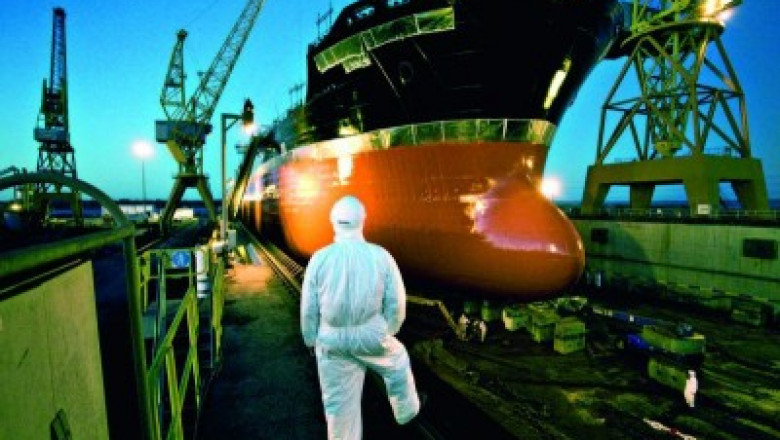views
Cleaning and Maintenance Chemicals
One of the most commonly used types of marine chemicals are cleaning and maintenance products. These chemicals help keep vessels clean, corrosion-free, and in good working condition despite the harsh marine environment. Some popular cleaning and maintenance chemicals used in the marine industry include:
Deck Cleaners- Marine Chemicals is deck cleaners are designed to remove salt spray, algae, mold, mildew and other organic build up from the topside areas of ships and boats. The best deck cleaners contain surfactants to break up grease and grime plus bleach or oxidizing agents to sanitize surfaces.
Bilge Cleaners- Bilge areas on vessels tend to collect oil, fuel, water and other contaminants which can promote corrosion if not kept clean. Biodegradable bilge cleaners safely remove these deposits without harming bilge pumps or polluting surrounding waters. Bilge cleaners may contain degreasers, sanitizers and rust inhibitors.
Metal and Hull Cleaners- To prevent corrosion and biofouling, the underwater hull portions of vessels need regular cleaning. Specialty hull cleaners cut through marine growth as well as oxidized paint and corrosion using powerful degreasers and etchants. Some hull cleaners may also contain antifouling agents.
General Purpose Cleaners- For all-around shipboard use, general purpose cleaners tackle a variety of cleaning jobs on both interior and exterior surfaces. These multi-surface cleaners are great for windows, decks, rails and equipment using mild formulas that won't damage finishes.
Corrosion Inhibitors and Rust Preventatives- Moist sea air and saltwater are notorious for causing rust and corrosion issues on vessel metalwork. Regular application of rust preventatives forms a protective barrier to discourage oxidation even in wet conditions. There are vapor-phase as well as liquid-phase rust preventatives available.
Lubricants and Greases
Proper lubrication is critical for ensuring machinery, deck equipment and moving parts last as long as possible despite ocean spray and moisture. Leading marine lubricants include:
Engine Oils- Specialty engine oils formulated for marine diesels and gas engines withstand varying conditions better than automotive oils. They have improved foam resistance, detergency and anti-wear additives.
Gear and Transmission Oils- Synthetic or mineral-based lubricants for marine gearboxes, driveshafts and transmissions are designed to perform under high load and withstand water contamination better than generic auto lubricants.
Wire Rope Lubricants- To reduce wear on anchor and mooring lines, specialized lubricants form a corrosion-fighting film while also lowering friction. Common wire rope lubricants include greases as well as spray-on coatings.
Hydraulic Oils- Hydraulic systems on equipment like cranes and winches need oil capable of operating at high pressures and tolerating small amounts of moisture infiltration. Leading hydraulic oils for marine use contain premium anti-wear and rust inhibitors.
Greases- Greases help protect deck equipment bearings, winch gears and other metal parts from exposure. Marine greases are often synthetic-based and water resistant with added corrosion protection. Some greases also offer adhesive properties to better adhere to metal surfaces.
Surface Coatings and Paints
To protect the integrity of a vessel's topsides and below the waterline areas, specialized protective coatings are often applied. Marine paint and coating options include:
Anti-Fouling Paints- Applied to the immersed hull below the waterline, anti-fouling paints contain biocides that deter marine growth from attaching. Modern ablative paints slowly dissolve to continually expose fresh biocides. Ecologically safe foul-release coatings are also available.
Primer and Tie Coat Systems- Used as primer layers under anti-fouling or enamels, specialty marine primers securely bond new coats to the substrate. Some primers also inhibit corrosion under the surface coating. Tie coats improve bonding of successive layers.
Enamels and Non-Skid Paints- High-quality marine enamels, roof coatings and deck paints form durable, glossy finishes protecting topside metal and non-skid coatings provide slip-resistant traction. Non-skids may contain aluminum oxide, silicon carbide or ceramic microbeads.
Vinyl Esters and Epoxy Joint Compounds- For critical steel repairs under water or in moist areas, join seams and rebuilt sections with long-lasting epoxy or vinylester chemicals that bond securely to metal substrates.
Mastics, Sealants and Fillers- Flexible mastics seal out moisture at deck hardware, vents and other openings. Sealants re-adhere loose caulking while filler compounds make surfaces smooth prior to painting.
Other Marine Specialty Chemicals
Aside from the major categories above, vessels may also require an array of other specialized chemical products including:
Ballast Tank Treatments- Applied to prevent organism transport in ballast water as well as inhibit corrosion and residual moisture in empty holds. Common biocides include peroxide and bromine compounds.
Cleaning Solvents- For tougher grease and contaminant removal jobs, high-flashpoint solvents efficiently dissolve carbon deposits and unclog filters or jets. Solvents require adequate ventilation.
Rust Removers- Powerful rust removers transform rusted metal into a clean substrate ready for priming using acids, abrasives or proprietary dissolution formulas. Treat only small areas at a time.
Water Treatment Products- From filtration media to chemical clarifiers and disinfectants, water treatment systems rely on specific formulas tailored for maritime fresh water and sanitation uses.
Odor and Growth Control- Neutralize odors in bilges, heads or storage areas with enzymes or chlorine dioxide products. Mold and mildew inhibitors applied to wet areas prevent organic growth.
In the diversity of harsh conditions found aboard vessels at sea requires an equally wide selection of specialized chemicals formulated to achieve maximum effectiveness and safety in the marine environment. Proper handling and application of these essential marine chemicals plays a major role in keeping ships and boats operating efficiently
Get This Report in English Language: Marine Chemicals
Get This Report in Japanese Language: マリンケミカルズ
Get This Report in Korean Language: 해양 화학
About Author:
Vaagisha brings over three years of expertise as a content editor in the market research domain. Originally a creative writer, she discovered her passion for editing, combining her flair for writing with a meticulous eye for detail. Her ability to craft and refine compelling content makes her an invaluable asset in delivering polished and engaging write-ups.
(LinkedIn: https://www.linkedin.com/in/vaagisha-singh-8080b91)






















Comments
0 comment